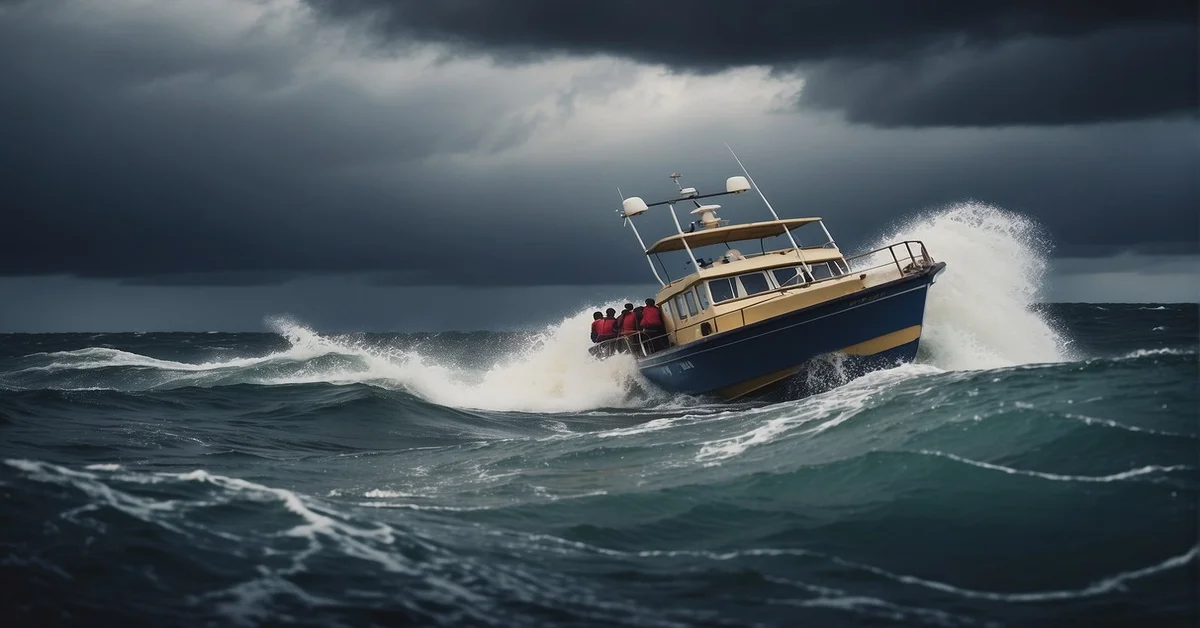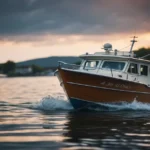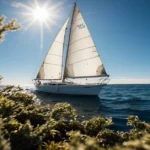Boating is an exhilarating experience, but it’s essential to remember that boating emergencies can arise when we least expect them. Recognizing the risks and being prepared is key to turning potential disasters into manageable situations.
Get ready to dive into the essentials of emergency preparedness that could save lives – because the next wave of adventure should be thrilling, not threatening!
Top 5 Most Common Types of Boating Emergencies
Safety is always at my mind when I’m on the water. However, I’ve learned that some boating emergencies are more likely to lead to fatalities. Look at the top five so you know what to watch out for.
- Drowning: Surprisingly, it’s not always from capsizing; sometimes, individuals fall overboard. Conditions like cold water or strong currents can turn a man-overboard situation deadly in minutes.
- Prevention tip: Wear a life jacket at all times.
- Capsizing and Swamping: When a boat overturns or fills with water, it often happens swiftly. Boaters must be prepared to deal with these situations, especially in rough conditions.
- Prevention tip: Balance loads and avoid overloading.
- Collisions: Whether with another vessel or a stationary object, collisions are a leading cause of boating incidents.
- Prevention tip: Keep a proper lookout and operate at safe speeds.
- Falls Overboard: Unexpected movement, slippery decks, or impairment can lead to someone falling into the water.
- Prevention tip: Move cautiously on deck and avoid alcohol consumption.
- Weather Related: Bad weather can surprise even the most experienced boaters, leading to emergencies that can quickly turn fatal.
- Prevention tip: Monitor the weather and head to shore at the first sign of a storm.
By being aware of these risks and taking proactive measures to prevent them, we can all enjoy a safer boating experience.
Understanding Boating Emergencies and Risks

Given my boating experiences, I know that understanding boating emergencies that cause fatalities is critical. It’s not just about the love of the open water but also about ensuring we all return safe.
Common Causes of Boating Accidents
Accidents on water, much like on land, can arise from many issues, but some are more frequent than others. Inexperience often leads to mishandling vessels, while alcohol use is a notorious contributor to impaired judgment and accidents.
Overloading and weather changes can swiftly shift a day’s sail into peril.
- Overwhelming Challenges:
- Misjudgment in visibility and weight distribution
- Sudden weather shifts
- Inadequate lookout or seamanship
Statistics and Impact
In recent years, recreational boating accidents have not only led to fatalities but significant property damage. According to the U.S. Coast Guard, there’s a notable record of drowning incidents and injuries:
- Drowning: 79%
- Injuries: Multiple thousands annually
- Property Damage: Estimates over $55 million
Safety Regulations and Education
Following regulations and participating in a boating safety course can reduce risks significantly. The Boating Safety Division of the U.S. Coast Guard is an excellent resource for boating education and enforcement. Their public awareness campaigns have also been pivotal in steering attention to safe boating practices.
Personal Safety Equipment
My safety gear is not complete without a life jacket for everyone aboard. First aid kits, communication devices, and fire extinguishers are not just regulatory: they’re lifelines. Conducting checks before sailing is vital to ensure all safety equipment is present and functional.
- Must-have Safety Equipment:
- Life Jackets: One per passenger
- Communication Devices: For emergency contact
- Navigation Tools: Maps or GPS devices
Preventive Measures and Best Practices
As a daily routine, I check weather forecasts and plan my route, keeping the navigation rules in mind to avoid collisions or grounding. Staying sober while operating the boat, maintaining a proper weight distribution, and having a capable lookout are preventive measures that cannot be overvalued.
- Best Practices for Boating:
- Regular seamanship training
- Emergency preparedness, including a marine radio
- Avoiding alcohol consumption while at the helm
Post-Emergency Analysis and Resources

When we discuss boating emergencies that cause fatalities, I must understand what leads to these tragic events and how to respond afterward. Through analyzing past incidents and using available resources, we can improve boating safety and prevent future tragedies.
Learning from Past Incidents
In the aftermath of a boating emergency, comprehensive analysis is key. We can learn valuable lessons by examining accidents and pinpointing the exact risks, like poor weather conditions or mechanical failure. For instance, the U.S. Coast Guard compiles statistics on boating fatalities, which helps understand the importance of seamanship and respecting navigation rules.
Boating Safety Resources
My access to boating safety resources is vital for preventing fatalities. By taking a boating safety course from reliable organizations such as the BoatUS Foundation, I can enhance my swimming abilities and knowledge of safe boating practices. Online resources further support my education in boating safety and recreational activity planning.
Advances in Boating Safety and Technology
Today’s boating safety and technology advancements present significant opportunities to reduce dangers. Enhanced communication devices, such as marine radios, greatly improve emergency response times.
Innovations in boating safety also include better public awareness campaigns, ensuring that boaters can stay informed even during increased recreational activity following a pandemic.
FAQ – Boating Emergencies

Do you have questions about boating emergencies? Our FAQ section is the lifesaver you need to keep your sea adventures safe and sound.
What type of boating emergency causes the most?
Capsizing or flooding
Both events can occur due to strong waves or winds, improper weight distribution, or damage to the hull. Capsizing and flooding are among the leading causes of fatalities in boating accidents.
What do you call a boat emergency?
MAYDAY – This distress signal requires the most urgent response. It is only to be used when a person or boat is threatened by grave or imminent danger and requires assistance.
What is the cause for most fatal boating accidents?
Falls overboard – This is the most common cause of boating accidents that result in death. It occurs when a passenger or operator accidentally falls off the vessel.
Have you weathered a boating emergency? Share your sea-tested wisdom in the comments and help fellow mariners navigate safely!










